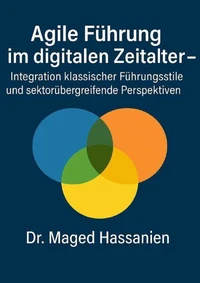Modern Leadership and artificial intelligence. What are the implications of AI for modern leadership - and how can modern leadership using AI succesfully?
Par :Formats :
Disponible dans votre compte client Decitre ou Furet du Nord dès validation de votre commande. Le format ePub est :
- Compatible avec une lecture sur My Vivlio (smartphone, tablette, ordinateur)
- Compatible avec une lecture sur liseuses Vivlio
- Pour les liseuses autres que Vivlio, vous devez utiliser le logiciel Adobe Digital Edition. Non compatible avec la lecture sur les liseuses Kindle, Remarkable et Sony
 , qui est-ce ?
, qui est-ce ?Notre partenaire de plateforme de lecture numérique où vous retrouverez l'ensemble de vos ebooks gratuitement
Pour en savoir plus sur nos ebooks, consultez notre aide en ligne ici
- Nombre de pages57
- FormatePub
- ISBN978-3-7598-1748-8
- EAN9783759817488
- Date de parution20/05/2024
- Protection num.pas de protection
- Taille556 Ko
- Infos supplémentairesepub
- ÉditeurA PRECISER
Résumé
The world of work is already subject to constant change due to demographic change,
changing values, a shortage of skilled labour and technological developments: As a
result, the requirements for good leadership are also changing and the methods and tools
of the past are no longer sufficient. Competent management of employees plays a central
role in the increasing competition for qualified specialists ("war for talent") for the
success of a company.
In an increasingly dynamic, networked and international world of work, the adaptability and willingness of managers and employees to cooperate are important key competences in the digitalised world of work (André et al., 2021; Hofmann et al., 2021). Traditional management models and tasks will gradually fade into the background. Co-operative, network-dynamic and value-orientated leadership styles will gain in importance. 1.
Data-supported decision-making: In order to make more informed decisions, managers can draw on a wide range of data that has been analysed by AI. This can help to minimise risks. At the same time, opportunities can be better utilised. 2. Automation of routine tasks: AI can automate many repetitive tasks, giving managers more time to think strategically and develop their teams. 3. HR management: AI can help with the selection, development and management of teams by analysing data on the performance and behaviour of employees. 4.
Use of chatbots and virtual assistants: Managers can use AI-supported tools to interact with employees, answer questions and provide information, thereby improving communication and the exchange of information. 5. Developing new business models: Companies are using AI to develop new products and services that can change entire industries. Understanding these developments and being able to react to them is essential for managers.
In an increasingly dynamic, networked and international world of work, the adaptability and willingness of managers and employees to cooperate are important key competences in the digitalised world of work (André et al., 2021; Hofmann et al., 2021). Traditional management models and tasks will gradually fade into the background. Co-operative, network-dynamic and value-orientated leadership styles will gain in importance. 1.
Data-supported decision-making: In order to make more informed decisions, managers can draw on a wide range of data that has been analysed by AI. This can help to minimise risks. At the same time, opportunities can be better utilised. 2. Automation of routine tasks: AI can automate many repetitive tasks, giving managers more time to think strategically and develop their teams. 3. HR management: AI can help with the selection, development and management of teams by analysing data on the performance and behaviour of employees. 4.
Use of chatbots and virtual assistants: Managers can use AI-supported tools to interact with employees, answer questions and provide information, thereby improving communication and the exchange of information. 5. Developing new business models: Companies are using AI to develop new products and services that can change entire industries. Understanding these developments and being able to react to them is essential for managers.
The world of work is already subject to constant change due to demographic change,
changing values, a shortage of skilled labour and technological developments: As a
result, the requirements for good leadership are also changing and the methods and tools
of the past are no longer sufficient. Competent management of employees plays a central
role in the increasing competition for qualified specialists ("war for talent") for the
success of a company.
In an increasingly dynamic, networked and international world of work, the adaptability and willingness of managers and employees to cooperate are important key competences in the digitalised world of work (André et al., 2021; Hofmann et al., 2021). Traditional management models and tasks will gradually fade into the background. Co-operative, network-dynamic and value-orientated leadership styles will gain in importance. 1.
Data-supported decision-making: In order to make more informed decisions, managers can draw on a wide range of data that has been analysed by AI. This can help to minimise risks. At the same time, opportunities can be better utilised. 2. Automation of routine tasks: AI can automate many repetitive tasks, giving managers more time to think strategically and develop their teams. 3. HR management: AI can help with the selection, development and management of teams by analysing data on the performance and behaviour of employees. 4.
Use of chatbots and virtual assistants: Managers can use AI-supported tools to interact with employees, answer questions and provide information, thereby improving communication and the exchange of information. 5. Developing new business models: Companies are using AI to develop new products and services that can change entire industries. Understanding these developments and being able to react to them is essential for managers.
In an increasingly dynamic, networked and international world of work, the adaptability and willingness of managers and employees to cooperate are important key competences in the digitalised world of work (André et al., 2021; Hofmann et al., 2021). Traditional management models and tasks will gradually fade into the background. Co-operative, network-dynamic and value-orientated leadership styles will gain in importance. 1.
Data-supported decision-making: In order to make more informed decisions, managers can draw on a wide range of data that has been analysed by AI. This can help to minimise risks. At the same time, opportunities can be better utilised. 2. Automation of routine tasks: AI can automate many repetitive tasks, giving managers more time to think strategically and develop their teams. 3. HR management: AI can help with the selection, development and management of teams by analysing data on the performance and behaviour of employees. 4.
Use of chatbots and virtual assistants: Managers can use AI-supported tools to interact with employees, answer questions and provide information, thereby improving communication and the exchange of information. 5. Developing new business models: Companies are using AI to develop new products and services that can change entire industries. Understanding these developments and being able to react to them is essential for managers.





